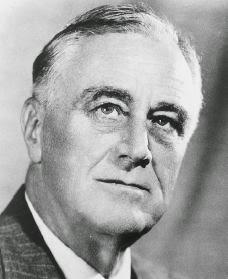 This is a guest post by Gene Bocknek.
This is a guest post by Gene Bocknek. [Photo is of Franklin Delano Roosevelt]
The recent Ken Burns PBS series on the Roosevelts is an astonishingly good documentary, a classic in every way. I had just finished reading Doris Kearn's biography of TR Roosevelt and doubted I needed any more. But the film and commentary are brilliantly done, with harsh honesty.
What I find remarkable is how one large family of fabulously wealthy high society produced two such men, one a Republican and the other a Democrat, both of whom recognized a debt to the common working people of the nation, brutally exploited by the equivalent of today's Walton family and Koch Brothers. A quotation from the lips of JP Morgan tells it all: "I owe the public nothing".
Unrestrained Capitalism had women and children factory workers - usually new immigrants - working 16 hour days, seven days a week, at poverty wages. Men and boys in coal mines had it worse, dealing with black lungs and periodic explosions.
Teddy Roosevelt acted on his own, avoiding a Congress that was controlled by those piratical millionaires, threatening to nationalize the mines unless the owners negotiated better terms with their workers. He set up a government agency to regulate prices of industrial and farm goods so as to provide better wages and working conditions. He also attacked monopolies which squeezed out competition to control prices and wages (the product of a "free market"). Theodore Roosevelt also endorsed a national income tax and enforcement of the anti-trust acts, and became the most loved president in American history.
FDR faced a nation during the Great Depression of the 1930s, created by shoddy practices on Wall Street, including buying stocks on margin (10% of cost). Only by bulling a reluctant Congress and Supreme Court was he able to institute the workers' right to organize, create
Social Security as a reward for a lifetime of hard work, provide jobs through his new Public Works Administration (PWA), Works Progress Administration (WPA), Civilian Conservation Corps (CCC), and support Republican Senator Norris' battle for the Tennessee Valley Administration (TVA), this latter for the poorest section of the nation. As the national leader Roosevelt broke America loose from its isolationism to face the threat of Nazi Germany by providing lend-lease equipment to Great Britain, and brought the nation into World War II when the Japanese attacked our naval fleet at Pearl Harbor.
Despite the benefits of great wealth and privilege the Roosevelt men chose to see the privations of the working class and felt a moral obligation to rectify that situation. It required heroic effort on their part, and earned them the bitter enmity of their wealthy peers.
They were sustained in their efforts by moral and/or religious convictions about the obligations of government toward its desperate citizens. They also recognized a truth that persists to the present time - that government is the only counterweight to unrestrained capitalism. In our time the president with the closest comparison is George W. Bush. There the comparison ends. Bush equated personal loyalty with competence, appointing ignorant people to nationally vital government positions in Homeland Security and Emergency Management. He stood by while Texas-based Enron stole the pension of 35,000 employees and further demonstrated his loyalty by invading Iraq on false, trumped-up charges of nuclear armament when his real concern was Saddam Hussein's refusal to cooperate with American and British oil interests.
Bush family oil connections included the Saudi family of Osama bin Laden. The 9/11/01 attack on the World Trade Center and Pentagon was perpetrated by Saudi Arabians! Bush issued an executive order permitting some 200 Saudis to leave the USA immediately after the attack, and barred the FBI and other agencies from interviewing any of them.
Bush also got Congress to pass a tax reform bill which reduced taxes on the wealthiest of our citizens. His budget cuts to pay for the lost revenue reduced the IRS staff of fraud investigators by 50%. Finally, he urged dissolution of Social Security in favor of providing citizens the "freedom" to invest their pensions elsewhere. The subsequent collapse of the stock market put a damper on that proposal. The enormous billions wasted on the Iraq invasion bankrupted the US Treasury which was his parting gift to President Obama, and laid the groundwork for the horrific mess of a fractured Iraqi nation and people now in evidence.
Not all rich president are the same!

